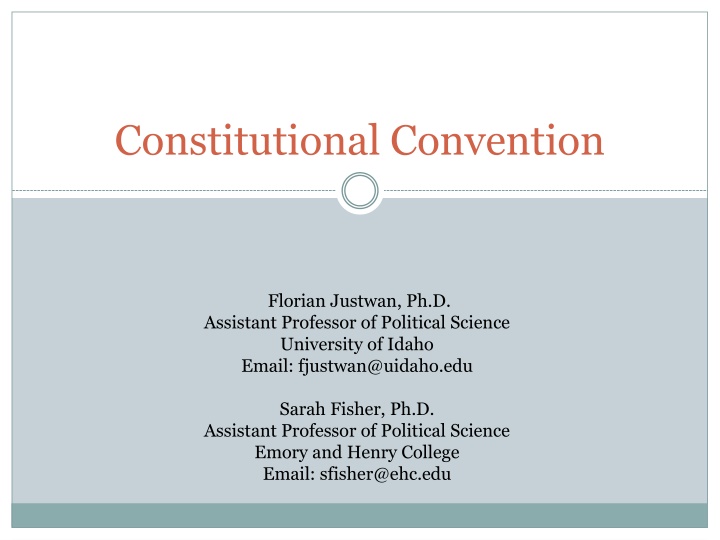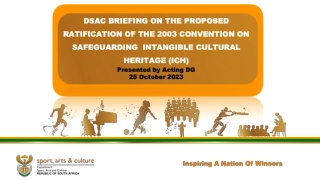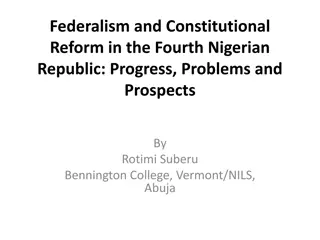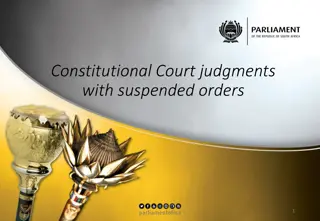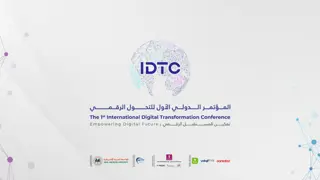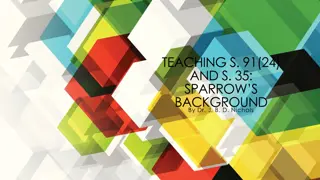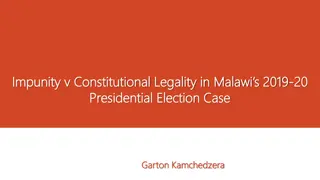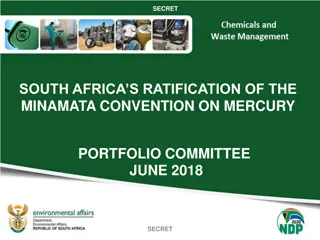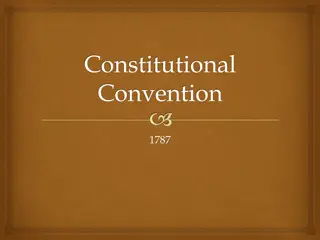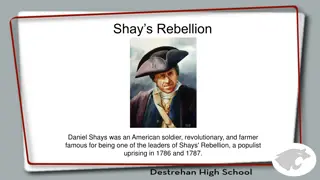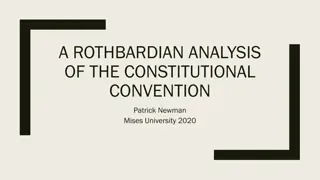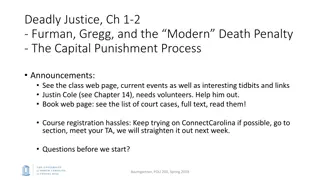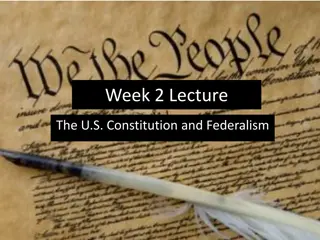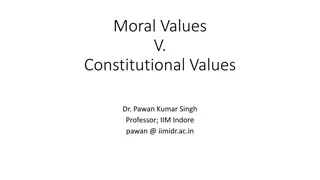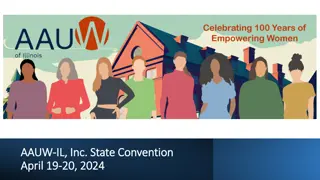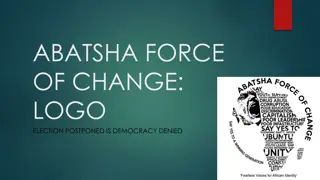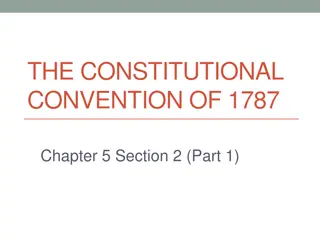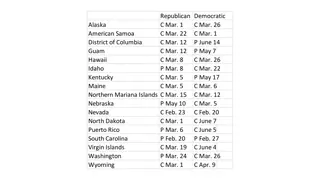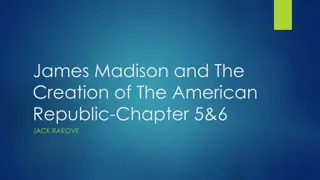Constitutional Convention and Country's Transformation
The content discusses the crucial decisions new countries face post-authoritarian rule, emphasizing constitutional design and addressing key issues like ethnicity, gender, and religion. It portrays the historical context of a nation overthrowing a dictatorship to create a new regime with societal inclusivity at its core.
Download Presentation

Please find below an Image/Link to download the presentation.
The content on the website is provided AS IS for your information and personal use only. It may not be sold, licensed, or shared on other websites without obtaining consent from the author.If you encounter any issues during the download, it is possible that the publisher has removed the file from their server.
You are allowed to download the files provided on this website for personal or commercial use, subject to the condition that they are used lawfully. All files are the property of their respective owners.
The content on the website is provided AS IS for your information and personal use only. It may not be sold, licensed, or shared on other websites without obtaining consent from the author.
E N D
Presentation Transcript
Constitutional Convention Florian Justwan, Ph.D. Assistant Professor of Political Science University of Idaho Email: fjustwan@uidaho.edu Sarah Fisher, Ph.D. Assistant Professor of Political Science Emory and Henry College Email: sfisher@ehc.edu
New countries have to make a lot of choices I Institutional Constitutional Design. Federalism / No Federalism. Judicial Review / Parliamentary Sovereignty. Flexible / Rigid Constitutions. Electoral System. Proportional Representation. District System with plurality requirement / runoffs. Alternative Vote System Powers of the Parliament. Bicameral vs. Unicameral Presidential vs. Parliamentary System If presidential, how is the president going to be elected?
New countries have to make a lot of choices II Issues. Does the Institution address Gender/Race/Ethnicity Issues? Are there quotas in the constitution? Does it talk about the Environment? What does it say about Religion?
Purpose of the simulation I We are simulating a country that has just overthrown an existing authoritarian leader. YOU! are the founding fathers of the new regime. It is your job to create a new constitution for this country. But: you will be representing one societal group in this country. Your opinions/positions during the convention have to reflect this. In other words: if you are a tiny minority that suffered under the leadership of the old dictator, you will probably not favor a strong presidency.
History of the Country I The country used to be a dictatorship for the past 20 years. It was ruled by a personalist dictator called Wilson Brownlock The official name of the country was: Democratic Republic of Jarth. Location of the Country: Africa (really does not matter at all)
History of the Country II Brownlock brutally oppressed the entire population. There was no freedom of speech and any kind of anti-government activity resulted in instant arrest. Brownlock came from one specific ethnic group (called: the Bandies ) and the top positions in the country (Ministers, Military) were filled with people form the same group. This is problematic since ethnic identities are very important for the people living in the Republic of Jarth. Other ethnicities had no real representation in the political system.
History of the Country III Here is a breakdown of the ethnic composition of Jarth: Bandies (29 % of the Population). Dorfas (38% of the Population). Takas (22 % of the Population). Algos (11 % of the population). Brownlock s rule seemed to be very well established. But after a clear economic downturn in the past 2 years, his regime couldn t pay the military forces anymore they overthrew the government and decided that it was time for democracy.
The Convention I The army leaders consulted with the United Nations. The U.N. set up a constitutional convention that is roughly representative of Jarth s population (in terms of ethnic identities). Bandies (2 Representatives). Dorfas (3 Representatives). Takas (2 Representatives). Algos (2 Representatives). YOU are one of these 9 representatives. It is your job to create a new constitution for this country.
Your Job Preparation! You are required to write a two-part paper. Part 1: Due at the beginning of class (bring a hard copy!) on December 1. Length: 2,000 words. Part 2: Due on December 11 at 5:00pm via email. Length: 1,000 words.
Paper Part I 2,000 words. Due at the beginning of class on December 1. 10 percent of your final grade. Outline the positions that you are going to take during the in-class simulation. Your positions have to be realistic for the ethnic group that you are assigned to. Your paper has to cover four of the following aspects. Federalism / No Federalism. Judicial Review / Parliamentary Sovereignty. Flexible / Rigid Constitutions. Electoral System. Powers of the Parliament. Presidential vs. Parliamentary System (if presidential: how is the president going to be elected) Your paper can cover all of the remaining aspects on that list and all other things you think should be in the Constitution.
Paper Part I EXPLAIN your choice of a particular constitutional provision. Don t just say I want a federal country because Federalism is good. Rather explain why YOUR ETHNIC GROUP favors Federalism. I will grade you based on: Completeness (did you talk about four of those aspects). Thoughtfulness (did you put effort into the paper).
Paper Part II 1,000 words. Due on December 11 at 5:00pm via email (fjustwan@uidaho.edu) 10 percent of your final grade. Reflect on the following five questions: 1. Which goals did you achieve during the constitutional convention and which goals did you NOT achieve? 2. Why did you fail to achieve certain goals? 3. Which group (Dorfas, Bandies, Takas, Algos) had the biggest influence during the negotiations and why? 4. If you had to do this simulation again, would you do anything different? Why? 5. Which lessons did you learn during this simulation about the process by which countries agree on their constitutions?
The simulation In class, you need to negotiate with the other representatives and create a constitution. This involves the following two steps: Find an acceptable compromise on what your new country should look like. Take a vote and adopt the document. Necessary Majority: 7 Representatives (note that this is actually a pretty contentious issue in reality. I am deciding this FOR YOU but in many cases, representatives debate about this aspect for a very long time!)
Background about the Ethnic Groups Bandies & Dorfas This information on the Bandies & Dorfas is available in our published article Sarah Fisher, Florian Justwan, (2017) Classroom convention: teaching comparative constitutional design through simulation, Social Studies Research and Practice, Vol. 12 Issue: 1, pp. 84-94. For more information please email sfisher@ehc.edu or fjustwan@uidaho.edu .
Background about the Ethnic Groups Takas I There are 2.2 million Takas in the Democratic Republic of Jarth. 0.2 million people live in Takatown, the capital city of the Taka homeland. 0.2 million people live in the countryside of the Taka homeland. The remaining 1.8 million people live spread out in the other regions of Jarth. 0.2 million in the Kal Valley (see next slide). 0.3 million in Dorfavilla, 0.3 million spread over the rest of the Dorfa homeland. 0.4 million spread over the Algo homeland countryside. 0.6 million in Bandopolis
Background about the Ethnic Groups Takas II GDP/capita (2013): 5,500 US-Dollars Primary source of income: Agriculture. Big grievances with the Bandies (see above) about mining in the Kal Valley. Copper in Kal Valley is a great source of revenue. Kal Valley used to be part of the Taka homeland, now it is Bandie- territory. At the beginning of Brownlock s dictatorship. Brownlock forced a lot of Takas who had lived in the Kal Valley for at least a century to resettle in other parts of the country. The Takas are very upset about the fact that the Kal Valley is now Bandie-dominated.
Background about the Ethnic Groups Takas III The Takas speak Taka. The were also very unhappy about the Brownlock dictatorship that forced everyone to speak/learn Bandy. The Algos living in Jara want to be able to speak their own language ( Algo ). However, the Takas are very proud of their own language and want to make Taka the official language for the entire homeland. In Taka culture, women have a relatively low status in the social and political realm. Politics is traditionally seen as something that should be done by men and schooling for girls is considered to be unnatural. The Dorfas are being ridiculed for their strong stance on gender equality.
Background about the Ethnic Groups Algos I There are 1.1 million Algos in the Democratic Republic of Jarth. 0.4 million people live in Algora, the capital city of the Algo homeland. 0.1 million people live in the countryside of the Algo homeland. The remaining 0.6 million people live in a city (called: Jara), deep inside the Taka homeland. The Algos have lived in this city for at least a century and form the majority population of Jara.
Background about the Ethnic Groups Algos II The Algos main source of income is tourism. People from all over the world come to see the ancient ruins of Jarth-city which was historically famous for its riches. GDP/capita: 12,000 US-Dollars (2013) Income from tourism: 800,000,000 (2013). The Algo Minority living in Jara suffers extreme pressures to adopt to the mainstream Taka culture. Language: The Algos living in Jara want to be able to speak their own language ( Algo ). However, the Takas are very proud of their own language and want to make Taka the official language for the entire homeland. Gender Relations: Algos think that women should have the same rights as men in the social and economic realm but that voting and running for office are male responsibilities. Environment: While some cultures in Jarth (the Bandies!) see the exploitation of natural resources as a major objective that humans have to achieve at all cost, the Algo have a very deep and spiritual relationship with nature. They are amongst the most environmentally friendly people in today s world. Jarth culture (and the damages created by mining) is very foreign to the Algos.
Background about the Ethnic Groups Algos III The Algos have the weakest sense of national identity of all the ethnicities living in Jarth. They identify more with the Algo groups living in some of the neighboring countries. In a recent survey, only 23 percent of all Algos said that they identify primarily as Jarthers. More than 50 percent of respondents identify primarily as Algos and declared that they would like to secede from the country. Main reason: The cultural differences between Algos and the other ethnic groups in the country are perceived as too big. Algos don t think that they have a lot in common with the rest of the groups living in Jarth.
